TAGGED AS: Disney, streaming, Superheroes, television, TV
Click image to open full poster in a new tab.
Although Secret Invasion debuted as one Marvel Studios’ less well-received ventures into television, it is still part of the ongoing Marvel Cinematic Universe saga — or sagas as the story took elements from both the previous Infinity Saga and the current Multiverse Saga. And like Thor: The Dark World before it, key details could still emerge from the program and, as the Multiverse Saga approaches its end in a few years, we could eventually see Secret Invasion in a different light.
But in the interim, what was the point of Nick Fury’s (Samuel L. Jackson) return to Earth? Or his absence for that matter? How do the geopolitics seen in this series sync up with what we saw in The Falcon and the Winter Soldier? And, considering the indefinite end of the tale, how will the fallout from Secret Invasion impact upcoming shows or features like The Marvels and Armor Wars? Let’s do a Secret Invasion debriefing and see what we can find under its skin.
Spoiler alert: The following contains plot details about the season 1 finale of Secret Invasion, “Home.” Stop reading here if you have not watched the episode and want to avoid spoilers.
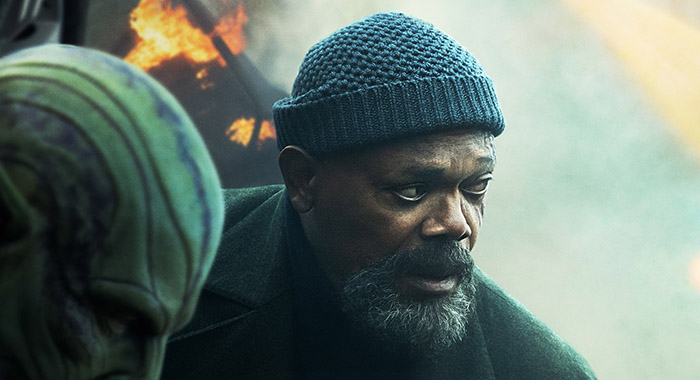
(Photo by Marvel Studios)
Click image to open full poster in new tab.
Although the program took its name from one of the most bombastic Marvel Comics crossovers ever published, Secret Invasion ended up a more low-key affair more concerned with an aging Fury than the possibility of, say, key heroes being replaced by shape-shifting Skrulls looking to invade the Earth. And while more personal interactions took the focus, it is interesting to note that the overall plot was a rumination on blowback.
The term, which simply means the negative and unintended consequences of an action, is quite specific when dealing with spies, secret operations, and geopolitics. In this context, blowback is the result of a highly financed security operation losing control of an insurgency it trained and backed. Across the series’ many flashbacks, we can see this is the root of Gravik’s (Kingsley Ben-Adir) desire to wipe humanity off the face of the Earth. Sure, claiming the planet for Skrulls is his stated intent, but considering Fury took a personal interest in his development, trained him to be part of his covert spy network, and put him in charge of collecting the Avengers DNA following the Battle of Earth, his disappointment in his mentor led to the blowback seen throughout the series.
In fact, it is easy to sympathize with the Skrull insurgency when you consider they waited 30+ years for Fury and Carol Danvers (Brie Larson) to find them a new homeworld, and Fury used their abilities to assemble an undetectable spy network/execution squad in the interim.
Even if Gravik’s methods proved inadequate (and often seemed an afterthought in the grand scheme of things), he personifies an interesting idea for the MCU: What if Fury created his own greatest monster for the sake of his country?
This rumination on blowback is marred, of course, in the execution. Since Fury and Gravik never really have a conversation through the duration of the series, he never truly owns up to the damage he caused. Even his phone call with Gravik in the finale is more about laying the groundwork for a ruse than any sort of culpability. The late revelation that he is attempting peace talks with the Kree — the alien empire that made refugees and warriors of the Skrulls in the first place — also rings a little hollow as he never really takes responsibility for the crisis at hand.
But perhaps G’iah understood Fury better than anyone realizes when she, as Fury, told Gravik that it’s easier to save the world than change the hearts and minds of its inhabitants. Fury will always accept the win before he answers to the fact he designed the game in the first place.
Like The Falcon and the Winter Soldier before it, Secret Invasion’s main plot is an interesting idea, but perhaps too interesting for a six-episode limited series. Especially when you consider President Ritson’s (Dermot Mulroney) response to the Skrulls at the end.
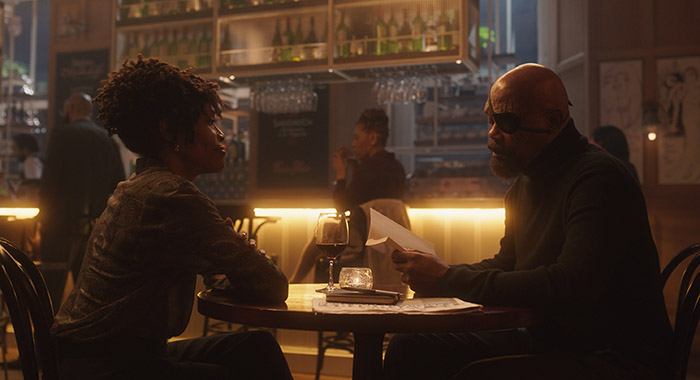
Charlayne Woodard as Priscilla Davis/Tarna and Samuel L. Jackson as Nick Fury in a scene from Secret Invasion episode 4, “Beloved” (Photo by Marvel Studios)
One of the show’s most curious quirks is the way any scene between two people — particularly if sat opposite from one other — proved more riveting than Gravik’s world-altering scheme. It’s true of the scene in which he’s promoted to Skrull General in episode 2, it’s also true of the scene between Fury and the Skrull posing as Colonel James Rhodes (Don Cheadle) in the same episode.
And it also charges the scene in which Fury and his wife, Varra (Charlayne Woodard), point guns at one another in episode 4. Of course, that one is potentially more charged than the others as Secret Invasion is also about the secret love of Nicholas J. Fury.
Told in flashback across several episodes, we learn Varra was another of the Skrulls willing to join Fury’s network. But in doing missions, she started to develop feelings for him and, after several years and faces, Fury started to feel likewise. But upon returning to their home at the start of the series, we learn something different occurred with his most recent absence and it threatens to break what they had together.
Varra is saint for putting up with his crap and disappearances for over two decades — did she even know if he was alive after his publicly announced death in Captain America: The Winter Soldier? — but as she states, his distance after the return Snap is something new they must confront. On top of that, the Skrull insurgency, and her part in it, refreshed the doubt she always felt in their marriage: Does Fury love her, Varra the Skrull, or “Priscilla,” the human face she wears?
Thankfully, Secret Invasion gives us enough time with them as a couple that we can conclude he isn’t lying when he says he loves her “as she is” before taking her to the S.A.B.E.R. space station. Visually, his truthfulness is backed up by the kiss between them after she assumes her true form. See also the moment when he says he is better with her and that she is the diplomat he needs for the Kree peace talks. While it may not reconcile with the actions that led to Gravik and the blowback, Fury’s personal life is one of the series’ more successful aspects.
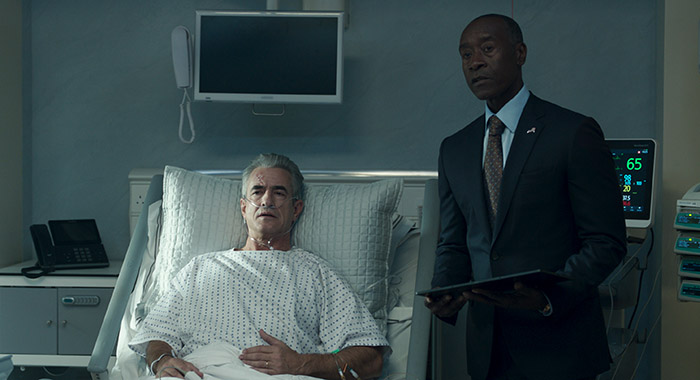
Dermot Mulroney as President Ritson and Don Cheadle as James “Rhodey” Rhodes in a scene from Secret Invasion episode 5, “Harvest” (Photo by Marvel Studios)
In the program’s final moments, President Ritson tells the American public that he intends to declare all off world–born life as enemy combatants. Fury refers to the action as both hate-filled and the choice of a one-term president. Whether or not it means Fury will take it upon himself to ensure Ritson is not re-elected — we already know a new president will appear in the July 2024 theatrical film Captain America: Brave New World — it reflects Marvel’s attempts, shaky or otherwise, to engage with geopolitics.
Consider this unintended fallout from Ritson’s decree: Will any Asgardians living in the U.S. be forced to leave as the wording of his order makes them the enemy in a conflict they had no part in? Will he attempt to take this up with the UN in order to remove New Asgard from the map? Will Peter Quill (Chris Pratt) still be allowed to crash on his grandfather’s couch as he is half alien?
Like the geopolitical implications of The Falcon and the Winter Soldier, we doubt subsequent productions will follow up on most of these questions. Note the complete lack of the Global Repatriation Council as an ongoing concern here in Secret Invasion. See also the return of S.H.I.E.L.D., which was seemingly teased at the end of TFATWS. At the moment, it appears Marvel wants to seed these ideas in viewers minds without exploring them too deeply. Otherwise, the series really should’ve been about Fury’s ability to build a space station and armada in secret with unlimited resources.
Then again, it is possible much of this will come to bear in Brave New World. That subtitle alone implies a great deal.
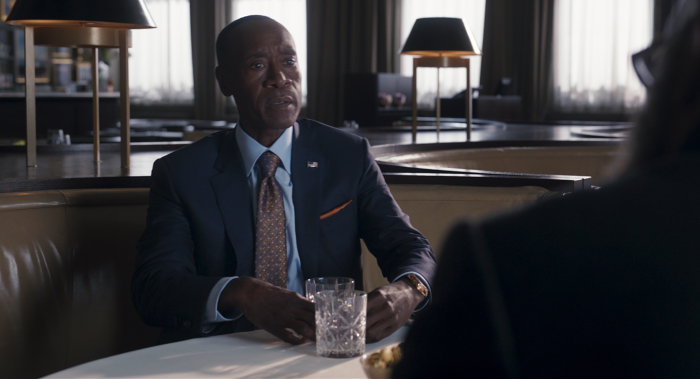
Cheadle in a scene from Secret Invasion episode 2, “Promises” (Photo by Marvel Studios)
Despite Marvel Studios President Kevin Feige declaring Secret Invasion an event too big to contain in one feature, it ultimately felt apart from the ongoing stories and in a world of its own. Is it possible the whole thing took place elsewhere in the Multiverse? It’s unlikely, but not something we can completely dismiss as the Multiverse Saga continues through 2027. But like the Infinity Saga before it, not every discrete story ties back to the overarching metaplot.
Armor Wars will tie back to Secret Invasion, however. Initially announced as another Disney+ series, it will ultimately arrive as a feature following Rhodey (now freed from Skrull captivity) as enemy agents obtain some of Tony Stark’s (Robert Downey Jr.) Iron Man technology. Presumably, Rhodey’s abduction will factor into the story as a character beat. How long ago was he abducted? Will he still work for the president, whoever that person happens to be? Will he be back as War Machine? Or will the film dramatize that journey back to being an Avenger?
Come to think of it, will any of these Marvel projects declare if the Avengers still exist in some form?
And considering the Iron Man armor, we expect Ironheart (Dominique Thorne), who appeared in Black Panther: Wakanda Forever and will headline her own Disney+ show next year, will be part of that war as well.
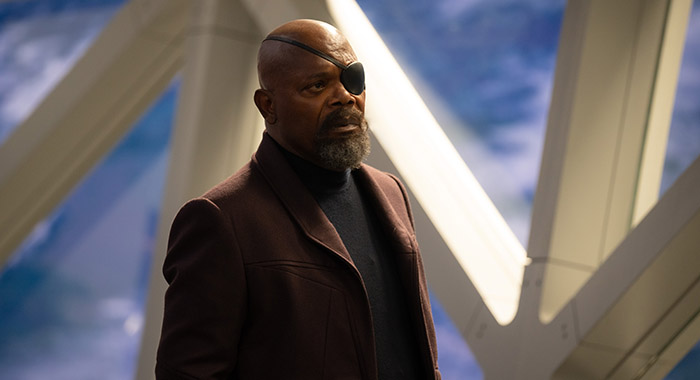
Jackson as Nick Fury in November theatrical film release The Marvels (Photo by Laura Radford/Marvel Studios)
Fury, meanwhile, will return in just a few months for the November 10 release of The Marvels. As glimpsed in its various trailers, he seems more his old self than the broken man featured in Secret Invasion. Hopefully, the film will answer the most pertinent question the series presented: Why did Carol Danvers fail to find the Skrulls a new homeworld? Also, we expect Carol’s opponent in the film, Dar-Benn (Zawe Ashton), will hamper Fury’s attempt to negotiate a Kree-Skrull peace.
The film may also address the real purpose of S.A.B.E.R. and the armada Fury has been building. We always assumed it was in anticipation of Secret Invasion, but now — who knows? Similarly, as Monica Rambeau (Teyonah Parris) is a featured character in The Marvels, we hope the film will address her absence throughout Secret Invasion. Was she aboard S.A.B.E.R the whole time? Her last moment in WandaVision saw her being approached by a Skrull, so is the space station mainly staffed by the aliens?
Back in the Disney+ realm, the next two programs, Loki season 2 and Echo, will likely not refer back to any events in Secret Invasion. Loki (Tom Hiddleston) will have his hands full befriending Mobius M. Mobius (Owen Wilson) again and convincing him their true enemy is hiding in plain sight when that series returns in October. November 29’s Echo, meanwhile, returns to the street-level storytelling of Daredevil and Hawkeye with its title character (Alaqua Cox) going home and trying to evade the pursuit of her uncle, Wilson Fisk (Vincent D’Onofrio).
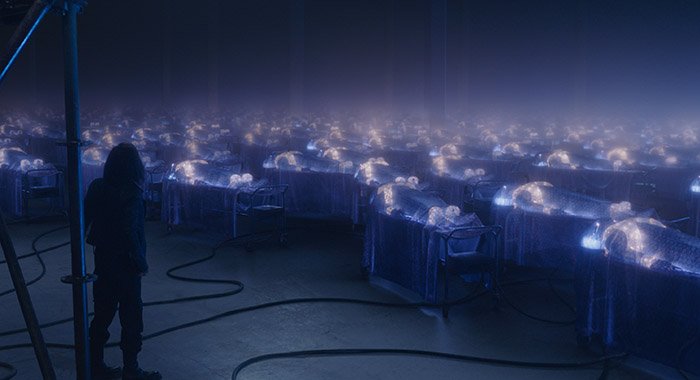
Clarke in Secret Invasion (Photo by Marvel Studios)
Further afield, though, the fallout of Secret Invasion could set up some interesting introductions. The alliance between Sonya Farnsworth (Olivia Colman) and G’iah, the only remaining Super Skrull, might lead, perhaps, to a UK-based superteam or a means of establishing Captain Britain and his psychically-charged sister. With Ms. Marvel already utilizing Marvel UK’s ClanDestine, could we really see Excalibur or even Death’s Head in the future?
Of course, that’s just wild speculation. Marvel has plenty on its plate just with announced projects and the current work stoppage. Avengers: Secret Wars, due in 2027, is both far away and too close for comfort, but like Avengers: Endgame before it, we may find in five-years’ time that Secret Invasion, warts and all, was secretly important.
![]() 53%
Secret Invasion: Season 1
(2023)
is now streaming in its entirety on Disney+.
53%
Secret Invasion: Season 1
(2023)
is now streaming in its entirety on Disney+.